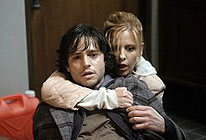|
|
|
|
The
Grudge
|
 |
|
For the first minutes of The Grudge – as we watch Bill Pullman in a short but intriguing introductory cameo, and then begin to follow the daily path of Karen (Sarah Michelle Gellar) – audiences may well wonder exactly where it is set. Are we in America or Japan? The matter is quickly settled in favour of the latter, but the oddness of this American remake of the Japanese horror hit Ju-On (2002) – recycling the same director, Takashi Shimizu, as well as key cast members – never disappears. The Grudge is a ghost or spirit story. No doubt weary of the interminable, increasingly insignificant parade of zombies and other monsters in contemporary American cinema, the producers (including Sam Raimi) have opted for the Asian trend in this genre. In films from Japan and Korea, seemingly old-fashioned devices like ghosts and haunted houses resonate anew with dread and cryptic meaning – especially when blended with modern audio-visual technologies, like in Ring (1998). Here, Karen is sent to work as a replacement nurse in a sinister home where the food is always on the floor and strange noises beckon from upstairs – leading to even stranger sights involving a cat, an obviously very angry woman (Takako Fuji), plus young Yuya Ozeki as (in the words of the press kit) a "cute ghost who follows his mother around". The original Ju-On is itself a flawed work. It is an uneasy amalgam of the hyper-atmospheric, deliberately ambiguous approach of Kiyoshi Kurosawa (Bright Future, 2004) with the less sophisticated shock tactics of Takashi Miike or the Ring films. Certain plot elements, such as the superfluous use of haunted mobile phones, seem particularly opportunistic. This remake retains and even exaggerates all of the original's problematic elements, while taking away what made it distinctive and arresting. Ju-On is told in titled chapters, each one focussing on a different character. This disconcerting, serial structure mimics well the seemingly infinite contagion of evil recounted in the story. The Grudge tries to flatten out and normalise this structure, whilst nonetheless being unable to avoid some crucial swerves and kinks. Worse still, Shimizu has been persuaded to adopt a style (fuelled by high-tech special effects) that replaces the subtle disquiet of the original with a bombastic, entirely predictable succession of noises and frights. The American influence also leads to an unnecessary humanising of the narrative. Karen becomes more central to events, a leading lady of sorts, and her romance with boyfriend Doug (Jason Behr) offers a facile spot of sentimentality. More damagingly, the central dark secret of the story is rendered less disturbing in its implications, becoming a mere pretext or device. Curiously, it is precisely the injection of humour – except for one delicious scene involving a real estate agent keen to seal the deal on the haunted house – which most undoes The Grudge. Many Japanese horror films tend to be militantly sombre. Audiences in English-speaking countries tend to find such unrelieved seriousness absurd – a cue for nervous, disengaged laughter. But it is sad to see the figure of the grudge-bearing ghost here becoming a tired, endlessly repeated joke. © Adrian Martin November 2004 |
![]()